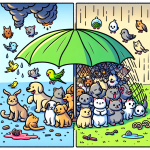
Why Stressed Koalas Are Facing a Health Crisis
Recent headlines have highlighted a worrying trend affecting our beloved Australian marsupials. Koalas, iconic for their laid-back demeanor and eucalyptus munching, are under siege by a physiological crisis tied deeply to stress and viral infections. The science community is buzzing with new findings from recent research, sparking a closer examination of this emerging threat.
Understanding the Koala’s Plight
Koalas have recently been grappling with what appears to be an epidemic-like outbreak of chlamydia—a bacterial infection that leads to blindness, infertility, and sometimes death in these marsupials. But it turns out that stress might be a significant underlying factor, exacerbating their vulnerability to this disease. Research conducted recently has shown that elevated stress levels among koalas are closely linked with an increase in Koala Retrovirus (KoRV) loads. This retrovirus weakens their immune system, making them more susceptible to secondary infections like chlamydia.
The intertwined relationship between stress, KoRV, and chlamydia highlights a critical aspect of koala health that requires immediate attention and proactive measures from conservationists and policymakers alike.
Causes of Increased Stress
Several factors are contributing to rising stress among koalas:
- Habitat Loss: Continuous deforestation and land clearing for agriculture and urban development are reducing the koala’s habitat.
- Climate Change: Increased frequency of droughts and heatwaves is not only depleting the food sources but also causing physiological stress.
- Interventions by Humans: While often well-meaning, interventions can sometimes cause undue stress to koalas during rescue, treatment, and relocation processes.
Why Conservation Efforts Need to Pivot
Given this alarming intersection of stress, viral load, and bacterial infections, it is crucial for conservation strategies to adapt accordingly. Dr. Paul McCarthy, a leading wildlife biologist, points out that a shift in focus from treating individual diseases to managing overall stress and health can make a significant impact. Key strategies should include:
- Habitat Restoration: Projects aimed at reforestation and protection of existing koala habitats can alleviate some stress.
- Comprehensive Health Check Programs: Regular health assessments that include screening for KoRV and chlamydia can aid early detection and treatment.
- Controlled Breeding Programs: Conducting breeding in controlled environments might help ensure less stress and better monitoring.
- Advancing Antiviral Therapies: Research into effective antiviral treatments could help in managing KoRV in the long term.
Community Involvement and Education
Community involvement is critical to the success of any conservation efforts. Educating the public about the direct and indirect impacts of human activities on koalas and encouraging sustainable practices is essential. Volunteer programs for habitat clean-ups and planting trees can engage communities directly in conservation efforts.
Protection of these endearing animals requires a collaborative effort from wildlife conservationists, local governments, and the public. By addressing the root causes of stress and enhancing koala resilience through improved health strategies, there is hope that Australia’s koalas can fight off extinction threats and thrive once again in their natural habitats.
For those interested in learning more about koala conservation and how they can assist with ongoing efforts, you can read more in-depth studies here.




